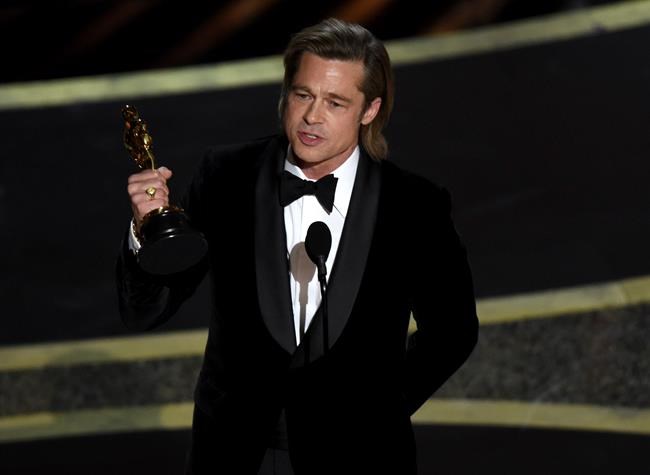Big wins for ‘Parasite’ give Oscar night an emotional high
Advertisement
Read this article for free:
or
Already have an account? Log in here »
To continue reading, please subscribe:
Monthly Digital Subscription
$0 for the first 4 weeks*
- Enjoy unlimited reading on winnipegfreepress.com
- Read the E-Edition, our digital replica newspaper
- Access News Break, our award-winning app
- Play interactive puzzles
*No charge for 4 weeks then price increases to the regular rate of $19.00 plus GST every four weeks. Offer available to new and qualified returning subscribers only. Cancel any time.
Monthly Digital Subscription
$4.75/week*
- Enjoy unlimited reading on winnipegfreepress.com
- Read the E-Edition, our digital replica newspaper
- Access News Break, our award-winning app
- Play interactive puzzles
*Billed as $19 plus GST every four weeks. Cancel any time.
To continue reading, please subscribe:
Add Free Press access to your Brandon Sun subscription for only an additional
$1 for the first 4 weeks*
*Your next subscription payment will increase by $1.00 and you will be charged $16.99 plus GST for four weeks. After four weeks, your payment will increase to $23.99 plus GST every four weeks.
Read unlimited articles for free today:
or
Already have an account? Log in here »
Hey there, time traveller!
This article was published 10/02/2020 (2129 days ago), so information in it may no longer be current.
Called up to the stage again and again, Bong Joon Ho kept saying he was ready for a drink — “bloody ready.”
But the Oscars weren’t bloody ready to stop giving him awards.
By the end, the South Korean director and his masterful social thriller “Parasite” had won best original screenplay, best international film, best director, and best picture, the latter a history-shattering win as the first non-English language film to win the top prize in the Oscars’ 92-year history.

Bong’s giddy, increasingly incredulous acceptance speeches — and the warmly raucous reception he received — were emblematic of an Oscar night that turned out to be much more inclusive and joyous than expected.
Indeed, when nominations were announced less than a month ago, the story was the depressing lack of diversity in the acting nominees, and the fact that no female directors were nominated. That obviously didn’t change, but the show itself struck an inclusive note from the start, with a bold and rousing performance by Janelle Monae. The night also saw the first Maori to win an Oscar; a rare win by a woman in the best score category; and the first actor with Down syndrome to present at the Oscars.
Some key moments of Oscars 2020, both serious and whimsical:
TIME TO COME ALIVE
As the very first person to take the stage, Monae set the tone when she plainly addressed the diversity issue in her opening number. “It’s time to come alive, because the Oscars is so white, it’s time to come alive!” she sang. Her performance directly referenced movies and actors who’d been snubbed in the nominations, and also the missing female directors.
“I’m so proud to stand here as a black, queer artist telling stories,” Monae said. “Happy Black History Month.”
MISSING: A CERTAIN REPRODUCTIVE ORGAN
Diversity — both racial and gender — was also a major topic of the “non-monologue” given by “non-hosts” Chris Rock and Steve Martin. (Like last year, the show famously went hostless.) Rock quipped pointedly that actor Mahershala Ali had two Oscars, but “you know what that means when the cops pull him over? Nothing.” Martin noted that among the directing nominees, something seemed to be missing. “Vaginas?” replied Rock.
A BIT O’ POLITICS
Although politics wasn’t a huge subject of the evening, Martin did manage to get off an effective one-liner about recent fumbles on the Democratic side, referring back to that time “La La Land” was mistakenly announced best picture — and then noting that wouldn’t happen this year, “because the academy has switched to the new Iowa caucus app.” Ouch.
THE PROM KING GETS HIS CROWN
This we know to be true: If Hollywood is high school, the Oscars is prom night. And Brad Pitt has always been the prom king, missing only his actual crown.
The much-admired actor, finally winning his first acting Oscar for his sly, knowing performance in Quentin Tarantino’s “Once Upon a Time … in Hollywood,” grew emotional as he looked back at his fairytale rise to Hollywood stardom, beginning with a combustively sexy performance in “Thelma & Louise” nearly three decades ago. “Once upon a time in Hollywood. Ain’t that the truth!” he said, misty-eyed.
He also got a little political. “They told me you only have 45 seconds up here, which is 45 seconds more than the Senate gave John Bolton this week,” he said in one of the few references to the recent impeachment hearings.
ADELE DAZEEM, CORRECTED

Introducing his co-star in the “Frozen” franchise, Idina Menzel, Josh Gad threw some shade at John Travolta for his famous mangling of the actress-singer’s name in 2014. Gad noted Menzel’s name was “pronounced exactly how it is spelled.” Menzel’s performance of the nominated song “Into the Unknown” included the appearance of Elsas from all over the world, belting along in their native tongues.
A FIRST FOR INDIGENOUS PEOPLE …
An emotional highlight of the night was Taika Waititi’s win for best adapted screenplay for the anti-hate themed “Jojo Rabbit.” Waititi, from New Zealand, became the first Oscar winner of Maori descent. He dedicated his victory “to all the indigenous kids of the world who want to do art and dance and write stories. We are the original storytellers, and we can make it here as well.”
Later, as a presenter, Waititi took the stage and noted the Academy was gathering “on the ancestral lands of the Tongva, Tataviam and the Chumash.”
… AND FOR DISABLED ACTORS
When “The Peanut Butter Falcon” star Zack Gottsagen appeared to present in the live-action short category, it was a first for both him and for the Oscars.
Gottsagen was the first presenter with Down syndrome, and he received a standing ovation after intoning the familiar line: “And the Oscar goes to …”
A NEW FIGHT CLUB
Rarely has the best original score category become a vehicle for a presentation on women’s empowerment, but that’s what happened Sunday night as Sigourney Weaver, Brie Larson and Gal Gadot — female action stars, past and present — took the stage.
After joking that they were forming a new fight club — “Men are all invited, but no shirts allowed,” Gadot said — they announced that for the first time, a female conductor (Eimear Noone) would lead the orchestra in performing nominated film scores.
Then Hildur Guðnadóttir won the award, for “Joker,” only one of three solo women to ever win best score.
“To the girls, to the women, to the mothers, to the daughters, who hear the music bubbling within, please speak up,” she said. “We need to hear your voices.”
AND SPEAKING OF VOICES
When Joaquin Phoenix won as expected, the “Joker” star spoke about “the opportunity to use our voice for the voiceless.” He added that he saw a commonality in the different causes people in the Hollywood community fight for.
“Whether we’re talking about gender inequality or racism or queer rights or indigenous rights or animal rights, we’re talking about the fight against the belief that one nation, one race, one gender or one species has the right to dominate, control and use and exploit another with impunity,” he said.

He also apologized for past behaviour. “I’ve been a scoundrel in my life,” he said. “I’ve been selfish, I’ve been cruel at times, hard to work with. I’m grateful that so many of you in this room have given me a second chance.”
EMINEM, TAKE TWO
Also getting a second chance was rapper Eminem, who stunned the crowd by showing up for a surprise performance of “Lose Yourself” — 17 years after it won best original song from the movie “8 Mile.”
On Twitter, Eminem, whose real name is Marshall Mathers, wrote: “Look, if you had another shot, another opportunity… Thanks for having me @TheAcademy.”
Mathers didn’t show up in 2003, when he won, but this time, in a category introduced by Lin-Manuel Miranda, he wasn’t throwing away his shot. (Ba-dum-bump.)
BUT NO SECOND CHANCE FOR ‘CATS’
Too soon?
Nah.
You knew somebody had to make fun of “Cats,” and they did — James Corden and Rebel Wilson, that is, who both came onstage in full “Cats” regalia.
“As cast members of the motion picture ‘Cats,’” Wilson said, at which point the audience was already laughing, “nobody more than us understands the importance of…”
“Good visual effects,” they said together.
Then they didn’t drop the mic. They just pawed at it, again and again.


